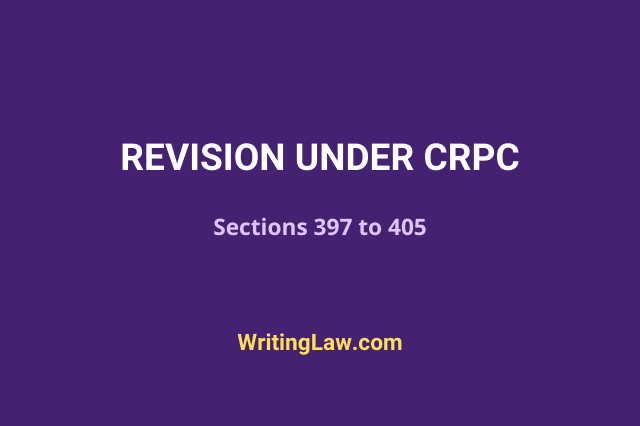
The word revision is not defined in the Criminal Procedure Code, 1973 (CrPC). However, the provisions for revision under CrPC are given in section 397 to section 405. Chapter XXX talks about reference and revision under CrPC. We have covered reference separately here. In this law note, let us understand what is revision in CrPC.
Section 397 CrPC – Call Records for Revision
Under section 397 CrPC, the High Court and Court of Session have been empowered to call for and examine the records of any proceeding and satisfy oneself as to the:
(a) Correctness, legality or propriety (correctness) of any finding, sentence or order recorded or passed.
(b) Regularity of any proceeding of an inferior court.
They have the power to direct the execution of any sentence or suspend or stay the lower court’s order during the pendency of revision or during the examination of record. The court may also direct to release the accused on bail by executing the bonds if the accused is in custody.
No Revision in Certain Orders
Revision is not maintainable against:
(a) orders which are appealable.
(b) Interlocutory order: The order which is temporary in nature and does not determine the substantial rights and liabilities of the parties.
Section 398 CrPC – Power to Order Inquiry
Section 398 of the Criminal Procedure Code provides for an order of inquiry that can be made after examination of record as given under section 397 of CrPC or otherwise.
The Revisional Court (Court of Session, High Court) shall order Chief Judicial Magistrate to inquire himself or through subordinate to make a further inquiry regarding:
(a) dismissal of a complaint under section 203, 204(4) of the Criminal Procedure Code.
(b) discharge of accused. Here, no order of further inquiry should be passed without giving an opportunity to the accused to showcase why a further inquiry should not be directed.
Section 399 CrPC – Power of Session Court of Revision
Court of Session has been empowered to exercise the same powers as given to High Court under section 401(1),(2),(3),(4),(5) of the Criminal Procedure Code.
When the Court of Session transfers a case to an additional session judge, the same powers can be exercised as given to the Court of Session under section 400 of the Criminal Procedure Code.
Section 401 CrPC – High Court’s Power of Revision
According to section 401(1) of the Criminal Procedure Code, High Court has all the powers which are conferred to the court of appeal under sections 386, 389, 390, 391 of the Criminal Procedure Code.
High Court also has the power that Court of Session has under section 307 of Criminal Procedure Code, that is, power to pardon.
According to section 401(2) of the Criminal Procedure Code, the reasonable opportunity of being heard will be given to the person against whom the hearing of revision is filed.
According to section 401(3) of the Criminal Procedure Code, the court exercising revisional power is not authorised to convert a finding of acquittal into one of conviction.
According to section 401(4) of the Criminal Procedure Code, where an order is appealable, no proceeding by way of revision shall be entertained.
According to section 401(5) of the Criminal Procedure Code,
- Where a person had a right to appeal, but by genuine mistake, an application of revision has been made to the High Court.
- And the High Court is satisfied that such application was made under the erroneous belief (that no appeal lies).
If High Court thinks it is in the interest of justice, the revision application shall be treated as a petition of appeal and dealt with accordingly.
Related Law Note: Criminal Appeal and Its Kind Under CrPC
Section 402 CrPC – Power of High Court to Withdraw or Transfer Revision Case
According to section 402(1) of the Criminal Procedure Code, when one or more person are convicted in the same trial, and one person files an application for revision to the Court of Session and the other at the High Court, then the High Court in such circumstances should decide as to which of the two courts should deal with the matter, keeping in mind:
(a) general convenience of parties.
(b) severity/importance of questions involved.
According to section 402(2) of the Criminal Procedure Code, when the High Court decides to hear the revision itself, the high court shall deal with the same as if the application was duly made to High Court itself.
According to section 402(3) of the Criminal Procedure Code, when the High Court decides to transfer application to the Court of Session, the judge shall deal with it as if the application was duly made to it.
According to section 402(4) of the Criminal Procedure Code, when revision is transferred to Court of Session, no further application shall lie to High Court or any other Court, whose application was dispersed by Court of Session.
You may also like to read:
1. Inherent Powers of the High Court.
2. Reference, Review, and Revision in Civil Procedure Code
- What Is a Foreign Judgement and When It’s Not Binding in India - 26th July 2022
- What Are Second Appeals Under Civil Law - 23rd June 2022
- Civil Appeal as Per the Civil Procedure Code - 12th June 2022







